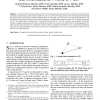Free Online Productivity Tools
i2Speak
i2Symbol
i2OCR
iTex2Img
iWeb2Print
iWeb2Shot
i2Type
iPdf2Split
iPdf2Merge
i2Bopomofo
i2Arabic
i2Style
i2Image
i2PDF
iLatex2Rtf
Sci2ools
156
click to vote
TMC
2012
2012
Network Coding in Cooperative Communications: Friend or Foe?
—A major benefit of employing network coding (NC) in cooperative communications (CC) is its ability to reduce time-slot overhead. Such approach is called network-coded CC (or NC-CC). Most of the existing works have mainly focused on exploiting this benefit without considering its potential adverse effect. In this paper, we show that NC may not always benefit CC. We substantiate this important finding with two important scenarios: employing analog network coding (ANC) in amplify-and-forward (AF) CC, and digital network coding (DNC) in decode-and-forward (DF) CC. For both scenarios, we introduce the important concept of network coding noise (NC noise). We analyze the origin of this noise via a careful study of signal aggregation at a relay node and signal extraction at a destination node. We derive a closed-form expression for NC noise at each destination node and show that the existence of NC noise could diminish the advantage of NC in CC. Our results shed new light on how to use ...
Related Content
| Added | 29 Sep 2012 |
| Updated | 29 Sep 2012 |
| Type | Journal |
| Year | 2012 |
| Where | TMC |
| Authors | Sushant Sharma, Yi Shi, Jia Liu, Y. Thomas Hou, Sastry Kompella, Scott F. Midkiff |
Comments (0)

